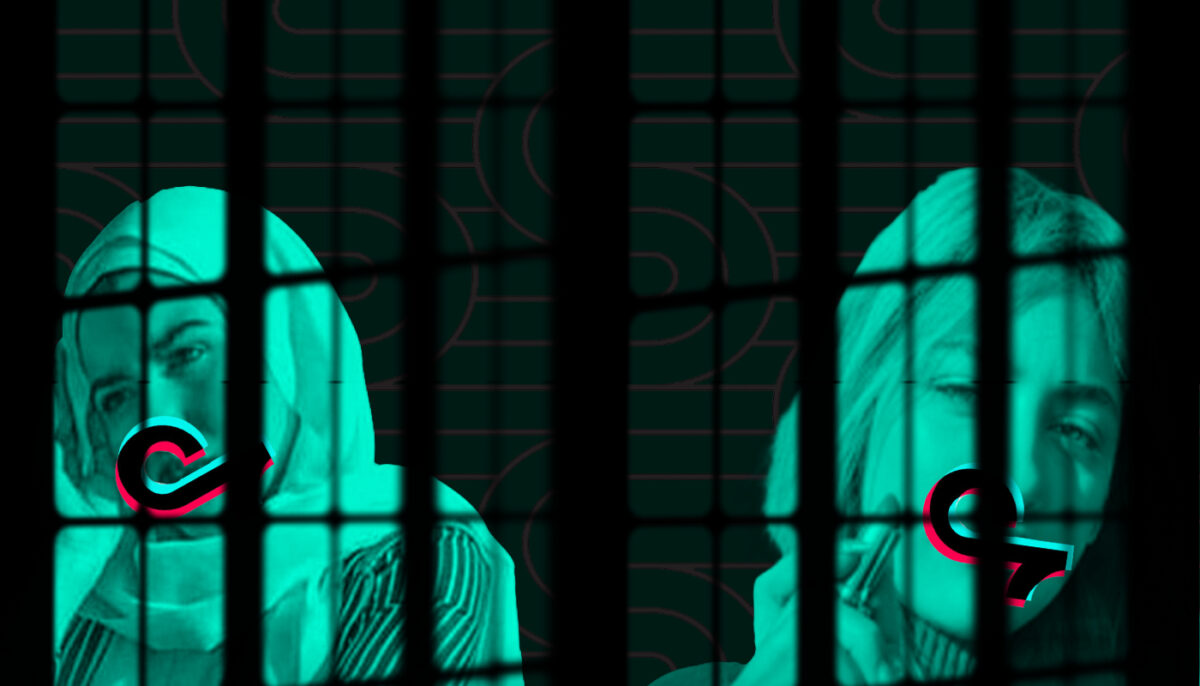As part of a wave of arrests against women content creators in Egypt, the Cairo Criminal Court sentenced Haneen Hossam, 21, to 10 years of prison and Mawada El-Adham, 22 to 6 years, on false charges of human trafficking. The two bloggers were also fined a sum of 200,000 EGP—around 13,000 USD—each.
Charges also included “receiving bank transfers in exchange for ‘Tiktok’ views,” “posting videos that incite debauchery,” and “being part of WhatsApp groups that involve exploiting girls.”
The court had previously ruled in January in favor of releasing Haneen Hossam on a bail sum of 5,000 EGP on the vague charge of “undermining Egyptian family values,” after rejecting the Public Prosecution’s appeal. In response, the Public Prosecution decided to stirrup the “human trafficking” case, considered a felony in Egypt, as opposed to the charge of “undermining Egyptian family values” which is treated as a misdemeanor.
While the Court ruled on the case of Mawada El-Adham who had been arrested, Haneen Hossam, who had been released on bail, abstained from attending the sentence hearing on the “human trafficking” charges and was therefore sentenced to 10 years in prison.
The first charge of “undermining Egyptian family values” was the subject of large-scale controversy in Egypt, given the ambiguity and unclarity surrounding the case, from evoking laws to issuing sentences. “The Prosecution is disciplining users and their families, as it constantly calls on parents to ‘look after their sons/daughters,’ subjecting some women to violence by their families,” argued some sources.
Massar – Technology and Law Community, had challenged the charge’s constitutionality, stating that the “Court is attempting to link internet use to the outcome it may entail, without clarifying the causal relationship between both.”
TikTok has yet to comment on any of these incidents. On the contrary, last year, the Chinese Ambassador in Egypt visited the Public Prosecutor and deemed these procedures understandable, adding that the company “shall comply with all Egyptian legal procedures, along with the traditions and customs of Egyptian society.”
SMEX condemns the ruling against Haneen Hossam and Mawada El-Adham, for it is utterly unjust. Dancing and lip-syncing on social media is not a crime. What they and others have published on #Tiktok is a mere attempt to express themselves, just like the billions of other users on the app. As such, silencing them and prosecuting them can only be considered an aggression against women’s freedom of expression online. We denounce the indictment of bloggers based on loose charges such as “undermining Egyptian family principles and values” and “human trafficking,” as court proceedings remain highly ambiguous with no evidence to back up such vague claims.
This case is a clear indicator of Egyptian authorities’ attempt to exert tighter control over the internet, and women, both on the financial and disciplinary levels. Egyptian citizens’ right to access and use the internet freely in #Egypt and other countries in the region must be defended. Women in Egypt must also be protected against defamation campaigns that shatter them psychologically and destroy their family’s lives, contrary to what the government claims it is trying to protect. We call on social media platforms such as TikTok and Likee to stand up for their users’ rights and freedoms, and to uphold human rights rather than favor oppression for financial gains.



